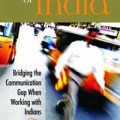
Here’s a real story with some fictionalized details:
Two North Americans (Ryan and Joel) had come to India to establish some connections for their new NGO/non-profit (FreshMedics) that markets medical device innovations for rural villages. They had some large financial partners waiting in the background, but wanted to time any announcements of public support with the launch of the product and the plan. Their partners understood this, but were eager to be on the forefront of the launch.
On this trip to India, they were looking to make contacts and meet some manufacturing partners. Knowing the importance of relationships in India, they took advantage of any opportunity they had.
They were introduced to a man named Ganesh, who had done a lot of work in a local village. Most of his work had been through an internationally recognized service organization called SERVIndia.
Ganesh showed Ryan and Joel around the village. They met with the villagers and even participated in a special festival that happened to be that day, including some folk dancing. Everyone had a great time, and Ryan and Joel left extremely thankful for the first-hand look at the village.
The next day, Ryan and Joel opened up their laptops to find an email from Ganesh thanking them for coming to the village. He attached 50 pictures he had taken of the event. In the mail trail, Joel noticed that Ganesh had put together a five-page bulletin about their visit for SERVIndia with the headline “SERVIndia welcomes FreshMedics to Village!” The bulletin had been sent to the national director of SERVIndia, who had already commended Ganesh for his excellent work in the matter. Ganesh had posted the photos on Facebook and tagged Ryan and Joel in all of them in an album titled “SERVIndia and FreshMedics partnering to uplift villages!”
Joel, head of business strategy, begins to panic. He knows that from the outside it will look like FreshMedics and SERVIndia are officially partners and his NGO is promoting SERVIndia. In his last round of talks with some potential big supporters, he told them they were going to be very selective in choosing where their support came from, and did not want to align with any organization without doing an extensive partnering process. He felt that once his potential supporters saw this, he would lose credibility with them and their support as well.
Joel feels betrayed by Ganesh, and feels like he was tricked into promoting SERVIndia, when at the time, it seemed like they were just having a good time.
What should he do?
One Possible Solution:
What he should not do is write to Ganesh and immediately address the issue. This will hurt Ganesh, who was honestly just trying to help build connections for Ryan and Joel. Ganesh sees the connection to SERVIndia as a great asset to them and can’t see why they would not immediately want to accept the friendship and promotion for their new start up (#See1See100). Ganesh is also feeling great because the national director has specifically recognized him for the good work, so to immediately jump into taking everything down would be a mistake.
Ideally, Joel needs to meet with Ganesh for coffee as soon as possible. A personal meeting is preferred because it is unlikely that Joel will be able to tactfully convey their need for privacy with the right tone over an email or phone.
He should first say how great it was to visit the village. He should talk about the great work they are doing in the village, and how beneficial it was to see it firsthand.
Once he has established his gratitude, Joel can slip in his dilemma and ask Ganesh for advice on the matter. He can say something like, “I have some potential partners back home who would be surprised to see our face on a publication from a brand as well-known as SERVIndia. I’m sure you understand the need for us to be a little discreet about this. We appreciate the help you have offered us, but what can we do?”
This way, Ganesh will likely understand the dilemma, but not be put in as awkward of a place as he might have if asked to take everything down immediately. He might suggest that he will write to the director immediately and ask that the bulletin not be circulated to anyone else. He might also suggest that he will send out a follow-up email to his group asking them not to forward on the details. Joel can ask him about the Facebook page, and Ganesh might then say that he can take down the pictures.
At that time, Joel would need to express his gratefulness again at being able to go to the village, and thank Ganesh for understanding the difficult situation he is in. Then, he should definitely say that he would be interested in partnering officially with SERVIndia once things get going, and they could look at doing a launch in the same village in a few months.
What else might you suggest?
Photo Credit: Prince Roy on Flickr





Joel and Ryan could try educating their support partners on what the words really mean and how things work. They could say that less should be heard in the media unveiling of the ‘partnership’ than it appears. They could explain how networking in India works and stress that this is a real positive step, regardless of whether any partnership between SERVIndia and FreshMedics develops in the future.
They could be excited and positive about the relationship and let their investors/supporters know that this is a very good step in the right direction.
It would still be good to have a personal meeting with Ganesh but back off a tad in trying to get him to remove the posts that ServIndia put up. Media such as this rarely have the impact we imagine them to have.
In other words be proactive relative to building understanding in their outside support partners and strengthen the relationship with Ganesh.
Wise words from a wise man. This is an important perspective to consider as well. I like the relationship building approach.
In such matters, I would recommend a much more direct approach than what the author suggested. The actions of Ganesh are not really due to a cultural mis-understanding. While taking 50 pictures, pasting them everywhere and getting an appreciation from the boss is all quite in line with the very rural Indian mind-set of “it is good to make new relationships and more foreign, the better” {you would notice total strangers wanting to take pictures with foreigners}, showing it off as a critical first step in partnership (which it wasn’t) is by no means an innocent misunderstanding. It cannot be – in fact quite to the contrary, the same rural hinterland mindset would prevent people from believing in the existence of a new partnership unless signed, sealed and notarized. And also such Ganeshs would be loathe to any publicity and definitely wouldn’t want to blow their own trumpet for a job well done.
Quite clearly this was a case of an overactive and competitive mind trying to take advantage of a well intentioned short interaction by a foreign team and get them into a position which they will find difficult to wriggle out of. Devious, if you can call it that and there is a strong supposition that it can all be, if it comes to it, explained away as a mis-expectation caused by cultural differences.
Ryan and Joel should deal with it firmly – may be even write to the boss, explaining that it was nothing more than a first interaction and there is some distance to cover before any definite partnership is sealed. And also agree on the communication protocol going forward. And be weary of such other players they would meet in their subsequent interactions across India. Pussy-footing it now would mean that the word would get around that they are easy prey.
You’ve given a good analysis for sure and hit at the heart of a lot of things. In this situation (referring to the real one it is based on), Ganesh was far from devious, although he was of “the more relationships the better” mindset. I think he was intentionally trying to set up a connection between the two, but from an honest perspective.
What would be the worst case scenario if Ryan and Joel came across too firmly?
Worst case scenario (assuming Ganesh is sincere and not devious) would be that he would be very hurt – he would see it as a loss of face with his boss and all the others to whom he has prematurely projected a partnership. He would think that he was unfairly victimazed by foreigners who misunderstood his eagerness. However it is his problem and Ryan and Joel should leave him to solve it for himself – they need to worry about their firm’s interests.
Over time (a couple of weeks), realization would come to Ganesh and as he is a sincere person he would always put the the needs of his organization above his personal feelings. The partnership is something to work towards and it would be silly of him to let the episode derail it. He will look at the message Ryan and Joel gave – i.e. that the earlier act of Ganesh showed presumptive behaviour his part and communication should be more organized, from their view point and would probably agree with them. It is a process of improvement of Ganesh and a direct message, though initially painful would accomplish the task better for all parties concerned.
Hi Neil — Great article and great blog! We met last year in Chennai. I don’t have an alternative solution but a very real alternative problem: what if Ryan and Joel had gone back to the US and then got the email from Ganesh? They can’t meet him again so they’ll have to write or call him. I can totally see your point about how a sensitive matter even if treated tactfully by the writer might offend a reader without the same level of English language and communication skills. But can the problem be at all solved from a distance?
Nice to hear from you again, Ravi! Handling this from a distance is not easy. Phil’s advice is that they shouldn’t worry about the media impact of the event, and rather explain pointedly to their potential backers that no official support has taken place. That might be a good place to start. Still, a phone call to Ganesh might be a good option (and likely better than an email alone). They could follow a similar pattern as the face-to-face meeting, sandwiching their concerns between their gratitude and hope for a future partnership.
In this real-life situation, Ryan and Joel asked me to intervene since I had a relationship with Ganesh and was on the ground. We don’t always have that option, but it can be a good one. Asking someone else to get involved can be a good strategy.
Sreedhar’s advice to tackle it head-on might be good if 1.)It really is a serious media issue which their sponsors are objecting to and they are not just assuming it might be, and 2.)They are wiling to risk burning the bridge with Ganesh and ServIndia.
I enjoyed this example and the comments very much. Hind sight is of course 20/20, but here are my suggestions — If confidentiality is critical, I would suggest that (1) a confidentiality agreement be signed stating specific confidentiality expectations and (2) change settings on facebook so that any tagging must be reviewed and agreed to before posting. I realize that preliminary agreements are not normal in India but this would enable a clear and concise discussion on the matter. I look forward to your future examples.
hello
Here the problem lies with the organization being a ngo/non profit. Ngos who want to do business are flying saucers for economic theories of management.
So try not to get, as we say in France, the butter and the price of the butter.
They should explain to the financial partners that it is a ngo job in the bush, not in manhattan. If these financial partners want to play this game, they must must consider different rules.
Ganesh did what he is use to do, according to his specific culture. Freshmedic has to adapt and relativize.
And next time accept an invitation after a survey if they want no waves.
best regards pp